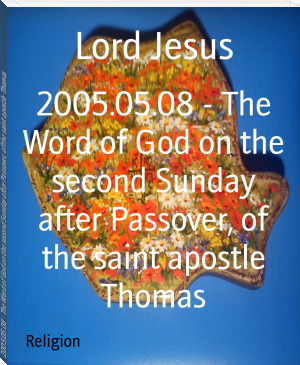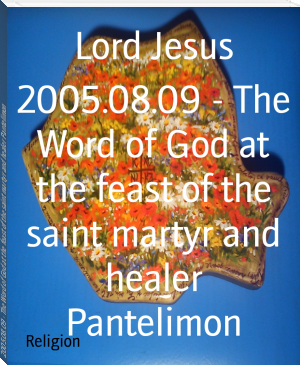The Story of a Soul - Saint Thérèse de Lisieux (best color ereader .TXT) 📗

- Author: Saint Thérèse de Lisieux
- Performer: -
Book online «The Story of a Soul - Saint Thérèse de Lisieux (best color ereader .TXT) 📗». Author Saint Thérèse de Lisieux
This reminds me that I used to have among my birds a canary which sang beautifully, and also a little linnet taken from the nest, of which I was very fond. This poor little prisoner, deprived of the teaching it should have received from its parents, and hearing the joyous trills of the canary from morning to night, tried hard to imitate them. A difficult task indeed for a linnet! It was delightful to follow the efforts of the poor little thing; his sweet voice found great difficulty in accommodating itself to the vibrant notes of his master, but he succeeded in time, and, to my great surprise, his song became exactly like the song of the canary.
Oh, dear Mother, you know who taught me to sing from the days of my earliest childhood! You know the voices which drew me on. And now I trust that one day, in spite of my weakness, I may sing for ever the Canticle of Love, the harmonious notes of which I have often heard sweetly sounding here below.
But where am I? These thoughts have carried me too far, and I must resume the history of my vocation.
On October 31, 1887, alone with Papa, I started for Bayeux, my heart full of hope, but also excited at the idea of presenting myself at the Bishop's house. For the first time in my life, I was going to pay a visit without any of my sisters, and this to a Bishop. I, who had never yet had to speak except to answer questions addressed to me, would have to explain and enlarge on my reasons for begging to enter the Carmel, and so give proofs of the genuineness of my vocation.
It cost me a great effort to overcome my shyness sufficiently to do this. But it is true that Love knows no such word as "impossible," for it deems "all things possible, all things allowed." Nothing whatsoever but the love of Jesus could have made me face these difficulties and others which followed, for I had to purchase my happiness by heavy trials. Now, it is true, I think I bought it very cheaply, and I would willingly bear a thousand times more bitter suffering to gain it, if it were not already mine.
When we reached the Bishop's house, the floodgates of Heaven seemed open once more. The Vicar-General, Father Révérony, who had settled the date of our coming, received us very kindly, though he looked a little surprised, and seeing tears in my eyes said: "Those diamonds must not be shown to His Lordship!" We were led through large reception-rooms which made me feel how small I was, and I wondered what I should dare say. The Bishop was walking in a corridor with two Priests. I saw the Vicar-General speak a few words to him, then they came into the room where we were waiting. There were three large armchairs in front of the fireplace, where a bright fire blazed.
As his Lordship entered, my Father and I knelt for his blessing; then he made us sit down. Father Révérony offered me the armchair in the middle. I excused myself politely, but he insisted, telling me to show if I knew how to obey. I did so without any more hesitation, and was mortified to see him take an ordinary chair while I was buried in an enormous seat that would comfortably have held four children like me—more comfortably in fact, for I was far from being at ease. I hoped that Papa was going to do all the talking, but he told me to explain the reason of our visit. I did so as eloquently as I could, though I knew well that one word from the Superior would have carried more weight than all my reasons, while his opposition told strongly against me. The Bishop asked how long I had wanted to enter the Carmel. "A very long time, my Lord!" "Come!" said the Vicar-General, laughing, "it cannot be as long as fifteen years." "That is true," I answered, "but it is not much less, for I have wished to give myself to God from the time I was three." The Bishop, no doubt to please Papa, tried to explain that I ought to remain some time longer with him; but, to his great surprise and edification, my Father took my part, adding respectfully that we were going to Rome with the diocesan pilgrimage, and that I should not hesitate to speak to the Holy Father if I could not obtain permission before then. However, it was decided that, previous to giving an answer, an interview with the Superior was absolutely necessary. This was particularly unpleasant hearing, for I knew his declared and determined opposition; and, in spite of the advice not to allow the Bishop to see any diamonds, I not only showed them but let them fall. He seemed touched, and caressed me fondly. I was afterwards told he had never treated any child so kindly.
"All is not lost, little one," he said, "but I am very glad that you are going to Rome with your good Father; you will thus strengthen your vocation. Instead of weeping, you ought to rejoice. I am going to Lisieux next week, and I will talk to the Superior about you. You shall certainly have my answer when you are in Italy." His Lordship then took us to the garden, and was much interested when Papa told him that, to make myself look older, I had put up my hair for the first time that very morning. This was not forgotten, for I know that even now, whenever the Bishop tells anyone about his "little daughter," he always repeats the story about her hair. I must say I should prefer my little secret to have been kept. As he took us to the door, the Vicar-General remarked that such a thing had never been seen—a father as anxious to give his child to God as the child was to offer herself.
We had to return to Lisieux without a favourable answer. It seemed to me as though my future were shattered for ever; the nearer I drew to the goal, the greater my difficulties became. But all the time I felt deep down in my heart a wondrous peace, because I knew that I was only seeking the Will of my Lord. ______________________________
[1] Cf. Psalm 18[19]:5.
[2] Luke 5:5.
[3] John 4:7.
[4] Eccl. 1:14.
[5] Ezechiel 16:8, 9, 13.
[6] Cf. Imit., III, ch. xliii. 4.
[7] Cf. Cant. 8:1.
[8] Luke 19:26.
[9] Cf. Luke 10:21.
[10] Cant. 2:3.
[11] Sister Agnes of Jesus.
[12] Cf. Matt. 18:6.
______________________________
CHAPTER VI A PILGRIMAGE TO ROMEThree days after the journey to Bayeux, I started on a much longer one—to the Eternal City. This journey taught me the vanity of all that passes away. Nevertheless I saw splendid monuments; I studied the countless wonders of art and religion; and better than all, I trod the very ground the Holy Apostles had trodden—the ground watered by the blood of martyrs—and my soul grew by contact with these holy things.
I was delighted to go to Rome; but I could quite understand people crediting Papa with the hope that in this way I should be brought to change my mind about the religious life. It might certainly have upset a vocation that was not very strong.
To begin with, Céline and I found ourselves in the company of many distinguished people. In fact, there were scarcely any others in the pilgrimage; but, far from being dazzled thereby, titles seemed to us but a "vapour of smoke,"[1] and I understood the words of the Imitation: "Be not solicitous for the shadow of a great name."[2] I understood that true greatness is not found in a name but in the soul. The Prophet Isaias tells us: "The Lord shall call His servants by another name,"[3] and we read in St. John: "To him that overcometh I will give a white counter, and on the counter a new name written which no man knoweth but he that receiveth it."[4] In Heaven, therefore, we shall know our titles of nobility, and "then shall every man have praise from God,"[5] and he who on earth chose to be poorest and least known for love of his Saviour, he will be the first, the noblest, and the richest.
The second thing I learnt had to do with Priests. Up to this time I had not understood the chief aim of the Carmelite Reform. To pray for sinners delighted me; to pray for Priests, whose souls seemed pure as crystal, that indeed astonished me. But in Italy I realised my vocation, and even so long a journey was a small price to pay for such valuable knowledge. During that month I met with many holy Priests, and yet I saw that even though the sublime dignity of Priesthood raises them higher than the Angels, they are still but weak and imperfect men. And so if holy Priests, whom Our Lord in the Gospel calls the salt of the earth, have need of our prayers, what must we think of the lukewarm? Has not Our Lord said: "If the salt lose its savour wherewith shall it be salted?"[6] Oh, dear Mother, how beautiful is our vocation! We Carmelites are called to preserve "the salt of the earth." We offer our prayers and sacrifices for the apostles of the Lord; we ourselves ought to be their apostles, while they, by word and example, are preaching the Gospel to our brethren. Have we not a glorious mission to fulfill? But I must say no more, for I feel that on this subject my pen would run on for ever.
Now let me describe my journey in some detail. At three o'clock in the morning of November 4, we passed through the silent streets. Lisieux still lay shrouded in the darkness of night. I felt that I was going out into the unknown, and that great things were awaiting me in Rome. When we reached Paris, Papa took us to see all the sights. For me there was but one—Our Lady of Victories. I can never tell you what I felt at her shrine; the graces Our Lady granted me were like those of my First Communion Day. I was filled with peace and happiness. In this holy spot the Blessed Virgin, my Mother, told me plainly that it was really she who had smiled on me and cured me. With intense fervour I entreated her to keep me always, and to realise my heart's desire by hiding me under her spotless mantle, and I also asked her to remove from me every occasion of sin.
I was well aware that during this journey I should come across things that might disturb me; knowing nothing of evil, I feared I might discover it. As yet I had not experienced that "to the pure all things are pure,"[7] that a simple and upright soul does not see evil in anything, because evil only exists in impure hearts and not in inanimate objects. I prayed specially to St. Joseph to watch over me; from my childhood, devotion to him has been interwoven with my love for our Blessed Lady. Every day I said the prayer beginning: "St. Joseph, Father and Protector of Virgins" . . . so I felt I was well protected and quite safe from danger.
We left Paris on November 7, after our solemn Consecration to the Sacred Heart in the Basilica of Montmartre.[8] Each compartment of the train was named after a Saint, and the selection was made in honour of some Priest occupying it—his own patron or that of his parish being chosen. But in the presence of all the pilgrims our compartment was named after St. Martin! My Father, deeply touched by this compliment, went at once to thank Mgr. Legoux, Vicar-General of Coutances and director of the pilgrimage. From this onwards he was often called "Monsieur Saint Martin."
Father Révérony watched my behaviour closely. I could tell that he was doing so; at table, if I were not opposite to him, he would lean forward to look at me and listen to what I was saying. I think he must have been satisfied with his investigations, for, towards the end of the journey, he seemed more favourably disposed. I say towards the end, for in Rome he was far from being my advocate, as I will tell you presently. Still I would not have it thought he deceived me in any way by falling short of the good will he had shown at Bayeux. On the contrary, I am sure that he always felt kindly towards me, and that if he opposed my





Comments (0)